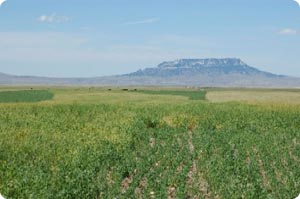Sustainable Practices

A recent change to our Extension Store has resulted in many of our publications having broken links. Our recommendation for now is to go the updated Store (Home - Extension Store) and search on the title (or number) of the document. Our apologies for this problem.
Sustainable farming practices conserve soil, build long term soil tilth, protect surface and groundwater resources and reduce input costs for the producer. Some of these practices include preventing soil erosion and compaction, building soil organic matter content, monitoring soil nutrient levels and adjusting fertilizer timing and rate applications for maximum plant use. All of these affect the quality and quantity of crop production which can result in greater farm profits. These publications explain new research and Best Management Practices (BMPs) in sustainable nutrient management.
Look through Clain's presentations for information on sustainable practices.
- Growing Pulse Crops: Fertility for yield and N fixation Aug 2024 podcast
- Adding pulse grains to wheat rotations can increase economic returns Jan 2025 MSU Press release and Northern Ag network interview
- A brief video interview with Clain on how pulse crops can help reduce soil acidification (US Dry Pea and Lentil Council Jan 2020).
- Nitrogen Management to Increase Fertilizer Use Efficiency and Reduce Losses. webinar by Clain, available for 1 CEU in Nutrient Management for CCAs.
- Inoculation and Nitrogen Management to Optimize Pulse Crop Yield and Protein. Open-access to all readers and available for 1 CEU in Nutrient Management for CCAs.
- Using organic materials as a source of P nutrition for crops. Presentation by Dr. Joan Davenport, Washington State Univ. July 2018
- Montana Cool-Season Pulse Production Guide (EB0120)
- Management to Minimize Nitrogen Fertilizer Volatilization (EB0209)
- Crop and Fertilizer Management Practices to Minimize Nitrate Leaching (MT201103AG)
- Soil Nutrient Management on Organic Grain Farms in MT (EB0200)
- From Conventional to Organic Cropping: What to Expect During the Transition Years (MT200901AG)
- Sustainable Agriculture, Nutrient Focus (Nutrient Management Module 15)
- Nitrates in Soil and Ground Water Under Irrigated Crops (Fertilizer Facts No. 9)
Visit the Judith Basin Nitrogen Project webpage to understand and mitigate surface and groundwater nitrate sources.
